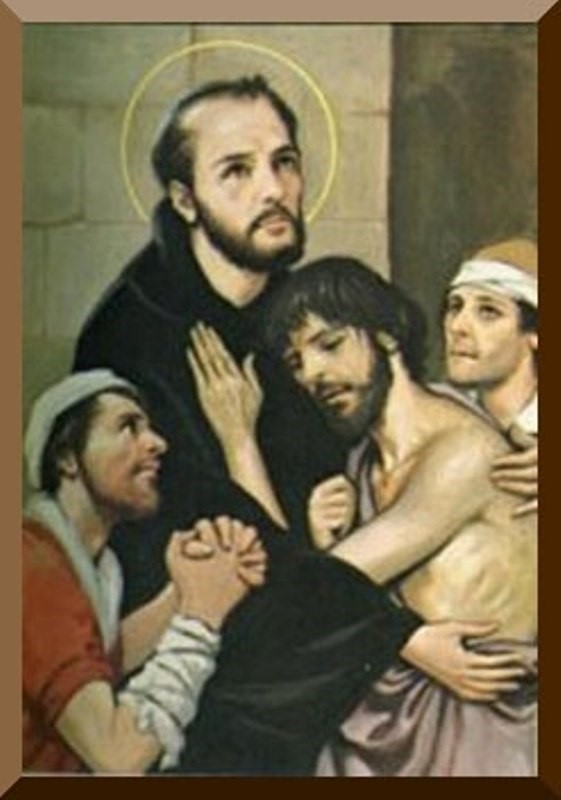From the time he was eight to the day he died, John followed every impulse of his heart. At eight years old, John heard a visiting priest speak of adventures that were waiting in the age of 1503 with new worlds being opened up. That very night he ran away from home to travel with the priest and never saw his parents again. They begged their way from village to village until John fell sick. The man who nursed him back to health, the manager of a large estate, adopted John. John worked as a shepherd in the mountains until he was 27. Feeling pressure to marry the manager’s daughter, whom he loved as a sister, John took off to join the Spanish army in the war against France. As a soldier, he was hardly a model of holiness, taking part in the gambling, drinking, and pillaging that his comrades enjoyed. One day, he was thrown from a stolen horse near French lines. Frightened that he would be captured or killed, he reviewed his life and vowed impulsively to make a change.
When he returned he kept his spur of the moment vow, made a confession, and immediately changed his life. He begged his way back to his foster-home where he worked as a shepherd until he heard of a new war with Muslims invading Europe. Off he went but after the war was over, he decided to try to find his real parents. To his grief he discovered both had died in his absence.
In Spain he spent his days unloading ship cargoes and his nights visiting churches and reading spiritual books. Reading gave him so much pleasure that he decided that he should share this joy with others. He quit his job and became a book peddler, traveling from town to town selling religious books and holy cards. A vision at age 41 brought him to Granada where he sold books from a little shop. (For this reason he is patron saint of booksellers and printers.)
After hearing a sermon from the famous John of Avila on repentance, he was so overcome by the thought of his sins that the whole town thought the little bookseller had gone from simple eccentricity to madness. After the sermon John rushed back to his shop, tore up any secular books he had, gave away all his religious books and all his money. Clothes torn and weeping, he was the target of insults, jokes, and even stones and mud from the townspeople and their children.
John of God could never see suffering without trying to do something about it. And now that he was free to move, although still a patient, he immediately got up and began to help the other sick people around him. The hospital was glad to have his unpaid nursing help, and were not happy to release him when one day he walked in to announce he was going to start his own hospital.
John may have been positive that God wanted him to start a hospital for the poor who got bad treatment, if any, from the other hospitals, but everyone else still thought of him as a madman. It didn’t help that he decided to try to finance his plan by selling wood in the square. At night he took what little money he earned and brought food and comfort to the poor living in abandoned buildings and under bridges. Thus his first hospital was the streets of Granada.
Within an hour after seeing a sign in a window saying “House to let for lodging of the poor” he had rented the house in order to move his nursing indoors. Of course he rented it without money for furnishings, medicine, or help. After he begged money for beds, he went out in the streets again and carried his ill patients back on the same shoulders that had carried stones, wood, and books. Once there he cleaned them, dressed their wounds, and mended their clothes at night while he prayed. He used his old experience as a peddler to beg alms, crying through the streets in his peddler’s voice, “Do good to yourselves! For the love of God, Brothers, do good!” Instead of selling goods, he took anything given — scraps of good, clothing, a coin here and there.
John was ill himself when he heard that a flood was bringing precious driftwood near the town. He jumped out of bed to gather the wood from the raging river. Then when one of his companions fell into the river, John without thought for his illness or safety jumped in after him. He failed to save the boy and caught pneumonia. He died on March 8, his fifty-fifth birthday, of the same impulsive love that had guided his whole life.


 Follow
Follow


